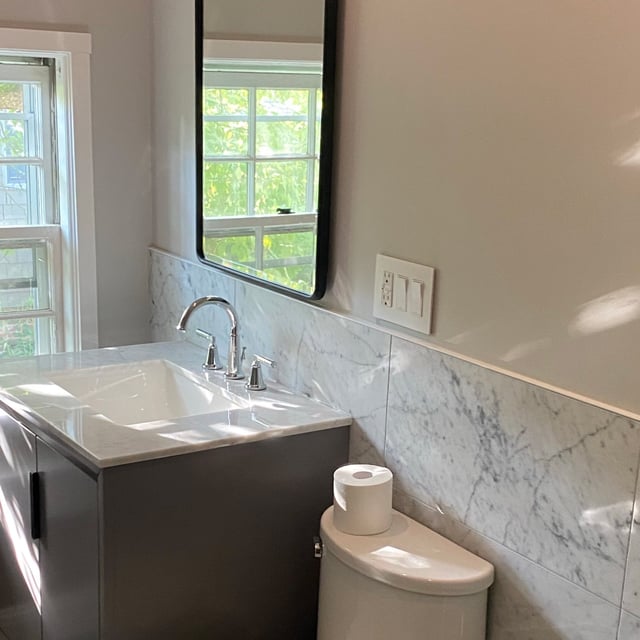
Bathroom
Small Luxury Bathroom Design Ideas
01.29.2026


In This Article
Renovating a bathroom is an exciting project, but it's important to understand the costs involved. Whether you're sprucing up a small powder room or transforming a spacious master bath, understanding the financial side is key. In Boston, bathroom renovation costs typically range from $10,000 to $25,000 or more, depending on factors like the size of the bathroom, quality of materials, and local labor rates.
This guide is here to help you navigate these considerations, so you can plan your renovation with confidence and ease.
When planning a bathroom renovation in Boston, it's crucial to understand the various factors that can influence your costs. Elements such as the size of the bathroom, the quality of materials chosen, and the complexity of design all play significant roles in determining the final price.
Additionally, Boston's unique market, including labor rates and permit requirements, can also impact your renovation budget. Here’s a quick summary of all the costs:
|
Aspect
|
Cost Estimate Range
|
|
Small Bathroom Renovation
|
$6,000–$12,000
|
|
Medium-Sized Bathroom
|
$12,000–$20,000
|
|
Large Bathroom Renovation
|
$20,000–$35,000+
|
|
Standard Materials
|
$1,500–$3,000
|
|
Mid-Range Materials
|
$3,000–$7,000
|
|
Luxury Materials
|
$7,000–$15,000+
|
|
Contractor Hourly Rates
|
$50–$150 per hour
|
|
Standard Layouts
|
$6,000–$15,000
|
|
Custom Designs
|
$15,000–$30,000+
|
|
Permits
|
$100–$500
|
Small Bathroom
Small bathroom renovations in Boston typically range from $6,000 to $12,000, making them a feasible option for homeowners looking to refresh a smaller space without a hefty price tag. These spaces might include a compact powder room or a small full bath, where you can focus on essential upgrades like fresh tiles, updated fixtures, and a new coat of paint. The cost for a small renovation can vary based on the choice of materials; for instance, opting for ceramic tiles over porcelain can help keep costs down without sacrificing style.
Despite their size, small bathrooms can still pack a punch when it comes to personalization and style. Even with a smaller footprint, you can create a sense of luxury by choosing elegant yet budget-friendly features such as sleek hardware or a modern vanity.
Medium-Sized Bathroom
For medium-sized bathrooms, costs generally hover between $12,000 and $20,000. These bathrooms often include more features, offering space for both a shower and a bathtub, along with vanity areas that allow for additional storage. This size allows homeowners to strike a balance between functionality and design, enabling more substantial upgrades without the full expense of larger bathroom renovations. Materials like mid-range tiles and fixtures can be both practical and visually appealing, providing a stylish refresh without going over budget.
In medium-sized renovations, homeowners have the flexibility to incorporate a few custom features, such as intricate tile patterns or a uniquely designed shower enclosure. This not only enhances the visual appeal but also increases the utility of the room. By mixing standard options with a few personalized touches, you can ensure the space meets your expectations while still adhering to your budget.
Large Bathroom
Large bathroom renovations, especially master ensuites, can range from $20,000 to $35,000 or more, depending on the custom features and materials chosen. These spaces offer generous room for luxury upgrades like separate showers and bathtubs, double vanities, and high-end finishes. The higher cost reflects not only the increased amount of materials but also the additional labor required to install components like intricate tilework or custom cabinetry. Such renovations can turn a large bathroom into a personal retreat, providing a spa-like experience at home.
In larger bathroom projects, homeowners have the opportunity to explore a range of upscale options, from heated floors to high-tech gadgets like smart mirrors and showers. While the initial investment is higher, these features can add significant value to your home, making it a wise long-term investment.
When considering a bathroom renovation, the quality of materials can significantly influence your overall costs. Standard materials are often the most budget-friendly option, helping you stay within a tighter budget. These might include laminate countertops, basic ceramic tiles, and pre-fabricated fixtures, generally costing between $1,500 and $3,000 depending on the scope and size of the project. While not the flashiest, standard materials offer reliability and durability, which can be ideal if you're looking to refresh your bathroom without overspending.
Mid-range materials strike a balance between cost and aesthetics, typically appealing to those looking to add a bit more style without breaking the bank. This category may include quartz countertops, porcelain tiles, and semi-custom cabinetry, with costs often ranging from $3,000 to $7,000. Mid-range options deliver a more tailored look and feel, providing an upgrade over basic materials while also enhancing the overall ambiance of the bathroom. They allow homeowners to express personality and creativity without veering into the luxury price bracket.
For those seeking an opulent bathroom space, luxury materials provide the highest quality and most stylish options. These might include natural stone tiles, custom-built vanities, and designer fixtures, with expenses generally starting around $7,000 and potentially exceeding $15,000. High-end materials not only elevate the look of your bathroom but also increase your home's value.
In Boston, labor costs for bathroom renovations can vary, with typical hourly rates for contractors ranging from $50 to $150. This cost might depend on the specific trade, such as plumbing, electrical work, or tiling. Hiring skilled professionals ensures that the work is done correctly and efficiently, which can ultimately save you money in the long run by preventing costly repairs or rework.
Choosing reputable professionals is crucial to ensuring the success of your renovation project. While it may be tempting to select the lowest bid, investing in experienced contractors with positive reviews and strong references can give you peace of mind. This approach often leads to higher quality results and fewer issues down the line, making it a wise investment in both your home’s value and your personal comfort.
Get matched with Block-vetted Boston contractors

Mark
MRCR DBA Quality Contracting 4.5

Ion
Art Deco Enterprises 4.6

Alberto
XP Contractors Inc 5.0

Isli
SABI Construction USA Inc 5.0

Sanuar
A Better Plus Construction Inc 4.6

Sara and Ernesto
American Precision Developers LLC 4.8

Mladen
Petarson Renovations 5.0

Elias
Big Foot Contracting 4.5

Steven
Terranova Construction 5.0

Gad
Golden State Designs 4.9

Leonardo
Andes Project Contractor Corporation 4.5

Juan
Fancy Construction 4.9

Joseph and Anca
QB Construction Inc 5.0

Piotr
Peter Renovations Inc 4.8

Harold
AAA Construction Services, LLC 5.0
When it comes to bathroom renovation, the choice between standard layouts and custom designs can significantly impact your budget. Standard layouts tend to be more cost-effective, typically because they utilize existing plumbing and electrical setups. This approach minimizes the need for structural changes, resulting in a budget-friendly renovation, generally ranging from $6,000 to $15,000 depending on materials and finishes. These designs are perfect for homeowners looking to refresh the space without altering the footprint of the bathroom significantly.
On the other hand, custom designs offer the opportunity to create a truly unique and personalized bathroom, but they come with higher costs. Custom layouts might involve moving plumbing fixtures, knocking down walls, or expanding the bathroom, leading to a price increase in labor and materials. These projects can start around $15,000 and exceed $30,000, depending on the extent of customization and the quality of finishes chosen.
When planning a bathroom renovation in Boston, it's essential to consider the need for specific city permits, which can influence your project's timeline and budget. Permits are required for various aspects of renovation, such as plumbing, electrical work, and any structural changes. These permits typically range from $100 to $500, depending on the scope of work. Securing the appropriate permits ensures that the renovation complies with local laws and helps avoid potential fines or delays.
Compliance with Boston's building codes is equally important, as these regulations ensure the safety and quality of construction. Adhering to codes can involve inspections at different stages of the project to verify that work meets the necessary standards. Hiring contractors familiar with Boston's specific regulations can simplify this process and ensure a smoother renovation. 
Understanding the breakdown of typical cost components in a bathroom renovation can help you manage your budget more effectively. From demolition and preparation to fixtures and fittings, each element contributes to the overall expense. By knowing what to expect in each category, you can prioritize spending based on your needs and preferences.
The demolition and preparation phase is the initial step in any bathroom renovation, setting the stage for the work to follow. This stage involves removing old fixtures, tiles, and any other existing materials that need to be replaced. In Boston, the cost for demolition can range from $500 to $2,500, depending on the size of the bathroom and the complexity of the teardown. This cost includes the labor for safely disposing of debris and preparing the space for the new installation.
Proper preparation also ensures that any underlying issues, such as water damage or mold, are addressed before proceeding with the renovation. This may involve additional costs if repairs are needed, which can vary significantly based on the severity of the problem.
Plumbing and electrical work are critical components of any bathroom renovation, ensuring that your bathroom is functional and up to modern standards. In Boston, the cost for plumbing can range from $1,000 to $5,000, depending on the complexity of the job and whether there's a need to move existing pipes or install new plumbing fixtures. Hiring licensed professionals is essential to handle these tasks safely, ensuring compliance with local codes and preventing potential issues like leaks or faulty connections.
Electrical work is another vital aspect, with costs typically ranging from $1,000 to $3,000. This may include upgrading the electrical panel to support new fixtures, installing outlets, or adding features like heated floors or towel racks. Ensuring that electrical work is done correctly not only enhances the functionality of your bathroom but also increases safety.
Choosing the right flooring and wall finishes can dramatically alter the appearance and functionality of your bathroom. Tile choices play a vital role, with options ranging in price and style:
Proper waterproofing is essential to prevent moisture issues, adding an additional $500 to $2,000 to your budget, depending on the size of the area and the materials used.
Labor for installing flooring and wall finishes generally costs between $1,000 and $3,500, varying with the complexity of the design and the type of tiles chosen.
Selecting the right fixtures and fittings is a crucial element in crafting the bathroom of your dreams. These components not only define the style of the space but also influence the functional comfort of your bathroom. Here's a general breakdown of costs for essential fixtures:
Complementing these main fixtures, fittings like faucets and showerheads also come in a range of prices, from $50 for basic options to $300 or more for high-end designs. When choosing fixtures and fittings, consider both your budget and your style preferences, aiming for a cohesive look that aligns with your overall bathroom design vision.
Vanity and storage solutions are crucial components in any bathroom, providing both functionality and aesthetic appeal. Prefabricated vanities are often the most cost-effective option, with prices typically ranging from $200 to $1,000. These vanities come in a variety of styles and sizes, making it easy to find one that fits your space and decor preferences. Prefabricated options are ideal for homeowners seeking a quick and easy installation at an affordable price, offering practical storage without a hefty expense.
On the other hand, custom cabinetry allows for a tailored fit and design that can make the most of your bathroom's unique layout and storage needs. Custom solutions can vary widely in cost, often starting around $1,500 and going up to $5,000 or more, depending on the materials and complexity of the design.
Proper lighting and ventilation are essential for creating a comfortable and functional bathroom environment. When it comes to lighting, options include:
Ventilation plays a critical role in maintaining air quality and preventing moisture build-up, which can lead to mold. Here are some options and their costs:
Additional features like dimmer switches or motion sensor lights can add convenience and efficiency, with costs generally starting around $20 to $100 each. Investing in these elements not only enhances your bathroom's ambiance but also contributes to overall energy efficiency and safety.
Labor and installation fees are significant components of your bathroom renovation budget, directly influencing the quality and efficiency of the work completed. In Boston, average rates for tradespeople can vary based on expertise and the complexity of the tasks. For general contractors, you might expect rates ranging from $50 to $150 per hour, reflecting the breadth of skills and project management capabilities they offer.
Specialized trades, such as electricians and plumbers, often command higher rates due to the technical nature of their work. Electricians typically charge between $75 to $150 per hour for installing fixtures or upgrading wiring. Similarly, plumbers may charge $75 to $150 per hour, especially for more complex tasks like relocating plumbing lines or installing new piping.
Planning a bathroom renovation in Boston involves understanding the average cost ranges to set realistic expectations. The cost can vary significantly depending on the size of the bathroom and the quality of materials and fixtures chosen. By familiarizing yourself with typical cost ranges, you can make informed decisions and tailor your renovation to fit both your budget and your design vision.
Renovating a small bathroom in Boston typically falls within a price range of $6,000 to $12,000. This budget allows for essential upgrades like new fixtures, fresh tiles, and a modern paint job. With careful planning, homeowners can achieve a charming and functional space that maximizes the available area without overwhelming costs.
In terms of quality, this price range can accommodate standard to mid-range materials, offering both durability and style. While luxury upgrades might be limited, thoughtful selections can create an inviting atmosphere. High-quality ceramic tiles, efficient fixtures, and smart storage solutions can transform a small bathroom into a space that feels both cozy and luxurious.
For a medium-sized bathroom renovation in Boston, the typical budget ranges from $12,000 to $20,000. This budget allows homeowners to incorporate a balance of functionality and style with more room for mid-range fixtures and finishes. Projects within this price range can include updates like a combination bathtub and shower, upgraded vanities, and enhanced lighting solutions.
This mid-range budget enables the selection of higher quality materials such as porcelain tiles and quartz countertops, adding both durability and elegance to the space. Homeowners can also explore design options like semi-custom cabinetry for improved storage and personalized touches that elevate the overall aesthetic. The flexibility in this cost range makes it possible to create a medium-sized bathroom that feels spacious and thoughtfully designed, meeting both practical needs and personal style preferences.
A large bathroom or master ensuite renovation in Boston typically involves a more substantial budget, ranging from $20,000 to $35,000 or more. This allows for a comprehensive transformation with high-end finishes and luxury features. With this investment, homeowners can explore a variety of opulent upgrades, such as separate shower and bathtub installations, dual vanities, and sophisticated tile designs.
Incorporating luxury details can significantly enhance the space's ambience and functionality. Features like radiant floor heating, custom cabinetry, and smart technology, such as programmable lighting and digital shower controls, can turn a large bathroom into a personal spa-like retreat. This budget not only covers premium materials like natural stone tiles and designer fixtures but also provides the opportunity to tailor the space to meet individual preferences, creating a truly bespoke and luxurious environment.
Budgeting effectively is essential for a successful bathroom renovation, ensuring that you get the best value for your investment. By planning carefully, homeowners can prioritize essential upgrades while still achieving their desired look and feel. With the right strategies, you can manage costs and avoid unexpected expenses, keeping your renovation on track and within budget.
When planning a bathroom renovation, it's important to identify and prioritize essential upgrades that will have the greatest impact on functionality and comfort. Begin by assessing which elements of your bathroom require immediate attention, such as:
Focusing on these core areas can enhance both the usability and aesthetic appeal of your bathroom without overspending. By addressing fundamental needs first, you ensure that your renovation creates a safe and efficient environment for daily use.
After tackling the most critical updates, you can then allocate any remaining budget towards aesthetic improvements and personal touches. Consider:
Prioritizing essential upgrades not only helps in managing your budget effectively but also provides a solid foundation to build upon if you choose to enhance further down the road especially if you’re going to finance the remodel.
One of the key strategies in managing a bathroom renovation budget is sourcing cost-effective materials that offer both quality and style. Start by exploring options that provide the best value, such as ceramic or porcelain tiles, which combine durability with a range of design possibilities at a reasonable price. Another approach is to look for sales or clearance items at local home improvement stores, where you can often find high-quality materials at discounted rates. Additionally, consider purchasing materials in bulk, which can lead to significant savings, especially for items like tiles and fixtures.
Reclaimed or recycled materials are another excellent option for those looking to save money while adding unique character to their bathroom. Using repurposed items like vintage vanities or reclaimed wood for shelving can not only reduce costs but also introduce a distinctive style element. It’s important to compare different suppliers to ensure you’re getting the best deals, and don't hesitate to ask for price matches or negotiate further discounts.
Choosing the right bathroom contractor is a vital step in ensuring your renovation is completed smoothly and to a high standard. Start by seeking recommendations from friends or family, and check online reviews to find reputable professionals in your area. It’s important to interview multiple contractors, discussing your project's scope and budget to ensure they understand your vision and can deliver within your financial limits. Verifying their credentials and references will also give you peace of mind, knowing that you’re working with experienced and trustworthy individuals.
Once you’ve selected a contractor, clear communication is key to a successful partnership. Set expectations by outlining your budget, timeline, and specific requirements in a written contract. Regular check-ins during the renovation process will help address any concerns promptly and keep the project on track. By fostering a collaborative relationship with your contractor, you ensure the renovation aligns with your goals while minimizing the risk of misunderstandings or unexpected expenses.
Even with careful planning, unexpected costs can arise during a bathroom renovation, and being prepared can make a big difference. Common areas where unplanned expenses tend to occur include:
To manage these potential surprises, it’s wise to set aside a contingency budget, typically around 10% to 20% of your total renovation budget. This financial cushion provides flexibility to address issues without derailing your plans. Additionally, maintaining open communication with your contractor can help identify potential problems early, allowing for quicker and more cost-effective solutions.
Timing can play a crucial role in maximizing savings during your bathroom renovation. In Boston, scheduling your project during the late winter or early spring can often result in cost benefits. During these months, contractors might have more availability, allowing you to negotiate better rates or secure discounts on labor and materials.
Moreover, avoiding peak renovation periods, such as summer or early fall, can prevent potential delays and allow for more focused attention from your contractor. Planning ahead and booking your renovation during these off-peak times not only helps in managing your budget but also ensures a smoother, more efficient renovation process.
Renovation trends in Boston reflect a blend of modern style and classic New England charm, offering homeowners a wide array of design possibilities. By staying informed about these popular styles and innovations, you can incorporate on-trend elements into your bathroom renovation for a fresh and appealing update.
In Boston, homeowners have a diverse range of bathroom styles to choose from, each offering unique aesthetic and functional benefits. Here are some popular options:
Choosing the right style depends on your personal preferences and the existing architecture of your home, allowing you to create a bathroom that complements your overall living space.
Many Boston homeowners are embracing eco-friendly and sustainable renovation choices to reduce their environmental impact while enhancing their homes. One popular option is the installation of water-saving fixtures, such as low-flow toilets and faucets, which significantly reduce water usage without compromising performance. These fixtures are not only environmentally beneficial but can also lower utility bills over time, providing a cost-effective upgrade for any bathroom renovation.
Sustainable materials are also gaining traction, with homeowners opting for elements like recycled glass tiles, bamboo flooring, and countertops made from reclaimed materials. These choices not only add unique beauty and character to a bathroom but also support eco-friendly practices by reducing waste and promoting resource conservation. By integrating eco-friendly elements into your renovation, you can create a stylish and efficient bathroom that contributes to a healthier planet.
Integrating smart technology into your bathroom renovation offers both convenience and efficiency, with options ranging from smart showers to automated lighting systems. Smart features like programmable thermostatic shower valves or Bluetooth-enabled mirrors typically cost between $200 and $1,500, depending on the sophistication of the items. These technologies enhance user experience by allowing customization of water temperature, lighting preferences, and even playing music, creating a luxurious and personalized space.
In addition to comfort, smart bathroom technologies can also improve energy efficiency and water conservation. Features like motion-sensor faucets and smart toilets help reduce water usage, contributing to environmental sustainability. While the initial investment might be higher, generally adding $500 to $2,000 to the overall cost, the long-term savings on utilities and the enhanced convenience and luxury can make these smart upgrades a worthwhile addition to your bathroom renovation.
Finding and hiring the right professionals in Boston is crucial to ensuring your bathroom renovation project is successful and stress-free. By selecting experienced and reputable contractors, you can achieve high-quality results that align with your vision and budget.
Selecting the right contractor for your bathroom renovation begins with evaluating their qualifications. Ensure they are licensed and insured, as this not only protects you but also signifies a level of professionalism and expertise. It's wise to review their portfolio of past projects to gauge their experience and capabilities, ensuring they align with your renovation goals.
Beyond qualifications, checking reviews and references is vital. Look for contractors with positive feedback from previous clients and ask for references you can contact directly. Speaking with past clients can provide valuable insights into the contractor's reliability, work ethic, and communication skills. This thorough vetting process helps build trust and confidence, ensuring that you choose a contractor who will deliver quality results on time and within budget.
Deciding between DIY and hiring professionals in a bathroom renovation hinges on costs and skill level. DIY can save 30% to 50% on labor, making it ideal for simple tasks like painting or basic fixture installation, if you have the right skills and tools. However, mistakes can lead to additional expenses, so it's important to factor in both potential savings and risk.
Professional work, while more expensive upfront, offers expertise and quality, crucial for tasks like plumbing and electrical work. The typical professional renovation ranges from $10,000 to $25,000, ensuring compliance with codes and reducing the risk of errors. Choosing a professional is wise for complex projects or when time is limited, balancing cost with the assurance of quality results.
In conclusion, understanding the costs, materials, and professional help required for your bathroom renovation in Boston is crucial for a successful outcome. By carefully planning and prioritizing key elements like budget, style, and reliable contractors, you can navigate the process smoothly. Thorough preparation and informed decisions will lead to a satisfying renovation that enhances both functionality and beauty in your home.

Written by Block Renovation
What is the average cost to renovate a small bathroom in Boston?
How long does a typical bathroom renovation take in Boston?
Are there specific building codes or permits required for bathroom renovations in Boston?
What are the best ways to save money on bathroom renovations in Boston?
How do labor costs for bathroom renovation in Boston compare to other major cities?

Renovate confidently with Block
Easily compare quotes from top quality contractors, and get peace of mind with warranty & price protections.
Thousands of homeowners have renovated with Block

4.5 Stars (100+)

4.7 Stars (100+)

4.5 Stars (75+)

Bathroom
Small Luxury Bathroom Design Ideas
01.29.2026
.jpg?width=640&name=5301c89b-3165-4f83-af34-a6b02eaa6c48%20(1).jpg)
Bathroom
Remodeling a Bathroom Into a Wet Room - Costs & Considerations
01.20.2026
.webp?width=640&name=d8151090-d347-11eb-9d1d-3514adcc0bb1%20(1).webp)
Bathroom
Bathtub Material Comparison: Fiberglass, Porcelain & More
01.20.2026
.jpg?width=640&name=7bacb6ea-82dc-403c-8e9a-191d2fb45b55%20(1).jpg)
Bathroom
Economical Bathroom Remodel Strategies
01.08.2026

Bathroom
Bathroom Mirror Trends to Inspire Your Ideas
01.07.2026
Renovate confidently